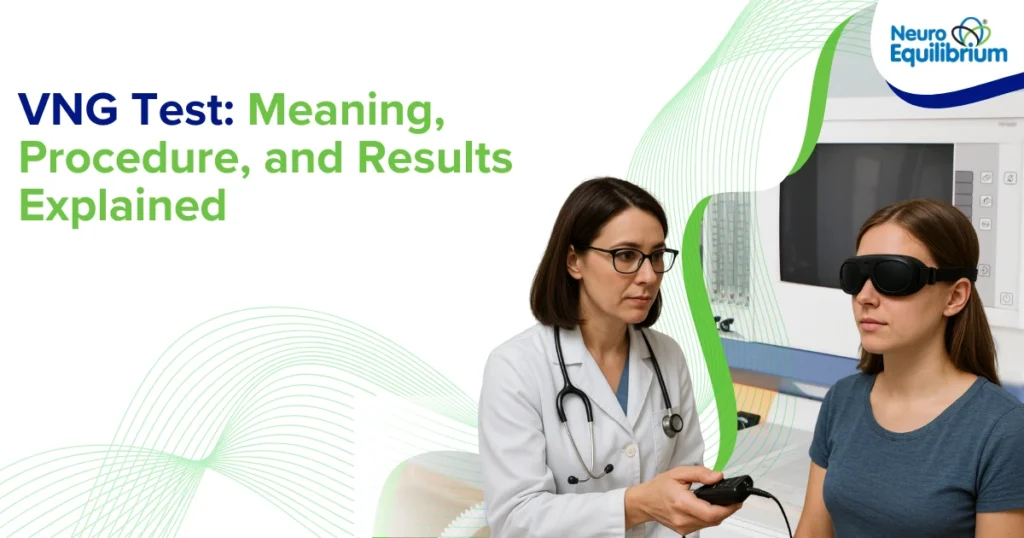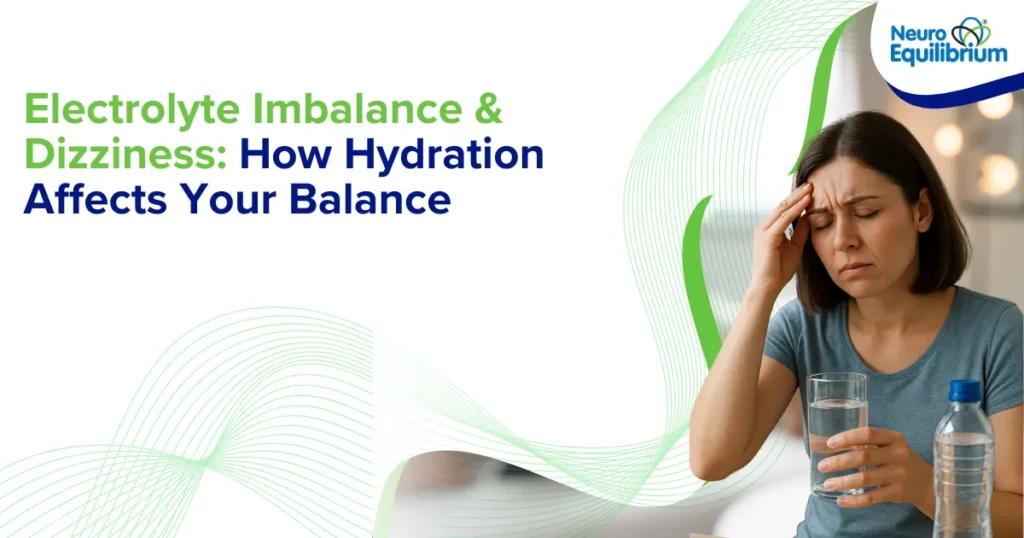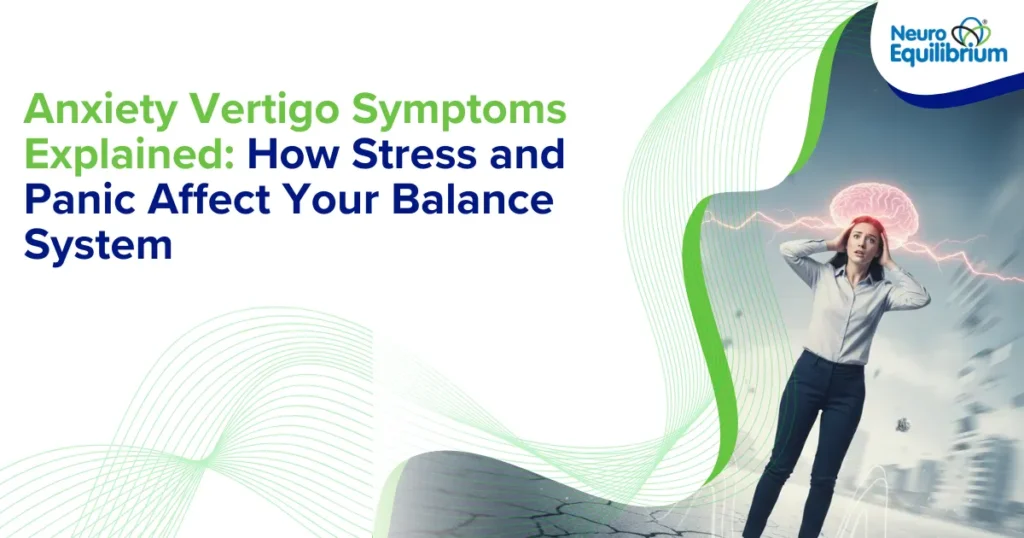Understanding the VNG Test: A Complete Guide
When dizziness or vertigo strikes, even simple activities like walking or turning your head can feel overwhelming. One of the most advanced diagnostic tools used by specialists to identify the root cause of these symptoms is the Videonystagmography (VNG) test.
At NeuroEquilibrium clinics, with over 250 specialized vertigo and dizziness centers across India and in more than 15 countries, the VNG test is a standard and highly effective diagnostic procedure. Many patients often ask what is VNG test and how it helps in diagnosing balance disorders. This guide covers exactly that, along with insights on VNG test cost in India and VNG test cost in Delhi.
What is a VNG Test?
The Videonystagmography (VNG) test is a modern diagnostic procedure that evaluates how well your inner ear balance system and the connections between your eyes and brain are functioning. It records involuntary eye movements (nystagmus) using infrared video cameras placed in lightweight goggles.
Since the inner ear and eye movement pathways are closely linked, abnormal eye movements can indicate whether dizziness or balance problems stem from issues in the vestibular (inner ear) system or the central nervous system (brain).
If you’ve been wondering what is VNG test and whether you might need it, it’s typically advised when patients report persistent vertigo, dizziness, or imbalance.
Know More About Vertigo
- Why Do You Feel Unsteady on Your Feet?
- What Happens When Dizziness and Blurry Vision Come Together?
- What Is Ear Balance Treatment and When Do You Need It?
Why is the VNG Test Done?
Doctors recommend a VNG test when a patient experiences:
- Frequent dizziness or vertigo
- Unexplained imbalance or unsteady gait
- Sudden episodes of spinning sensation
- Nausea and motion sensitivity
- Difficulty focusing or blurred vision with movement
For patients in India and globally, the test helps distinguish between ear-related vertigo (like BPPV, vestibular neuritis, or Ménière’s disease) and neurological causes such as migraine or brainstem disorders. This accurate diagnosis allows doctors to design the right treatment plan early.
If you’re searching online for VNG test cost in India, it’s important to know that prices can vary based on the city and clinic. However, at NeuroEquilibrium, the test is performed using advanced diagnostic systems by trained specialists at affordable rates. Patients specifically looking for VNG test cost in Delhi can expect detailed assessments with transparent pricing and precise analysis.
How is the VNG Test Performed?
The procedure is simple, painless, and usually takes around 60–90 minutes. At a NeuroEquilibrium clinic, it is conducted in four main stages:
- Oculomotor Testing – You follow moving lights on a screen to check how your eyes and brain coordinate.
- Positional Testing – Your head and body are moved into different positions to see if posture changes trigger abnormal eye movements.
- Caloric Testing – Warm and cool air or water are gently introduced into each ear canal to test inner ear function.
- Specialized Vestibular Tests – These include head-shaking, Valsalva-induced, and hyperventilation-induced nystagmus tests for deeper insights.
Throughout the process, your eye movements are precisely recorded through infrared goggles, and the results are analyzed by a vestibular specialist.

Understanding VNG Test Results
Normal Results: Indicate that your inner ear and brain coordination are functioning properly.
Abnormal Results: May point to conditions such as:
- Benign Paroxysmal Positional Vertigo (BPPV)
- Vestibular neuritis
- Labyrinthitis
- Ménière’s disease
- Vestibular migraine
- Central nervous system disorders
At NeuroEquilibrium, these findings are often combined with other diagnostic tools such as Dynamic Visual Acuity (DVA) and Subjective Visual Vertical (SVV) for a comprehensive evaluation.
Advantages of the VNG Test
- Non-invasive and safe procedure
- Provides objective, video-recorded data
- Detects subtle abnormalities often missed in routine exams
- Helps in customizing vertigo rehabilitation programs
Conclusion
If you or your loved ones suffer from recurrent dizziness, imbalance, or vertigo, the VNG test is one of the most effective ways to uncover the underlying cause. With state-of-the-art NeuroEquilibrium clinics spread across India and 15+ countries, patients can access world-class diagnostic care close to home.If you’re looking for reliable information about VNG test cost in India or specifically want to know about VNG test cost in Delhi, reach out to your nearest NeuroEquilibrium clinic. Early diagnosis through VNG testing not only reduces anxiety but also accelerates recovery with targeted treatment.
Is the VNG test painful?
No, the VNG test is completely safe and non-invasive. While some people may feel mild dizziness during certain parts of the procedure, it does not cause pain.
How long does a VNG test take?
The test usually takes between 60 to 90 minutes, depending on the number of assessments required for accurate diagnosis.
Do I need to prepare before the VNG test
Yes, your doctor may ask you to avoid caffeine, alcohol, certain medications, or heavy meals before the test to ensure accurate results. Specific instructions will be provided in advance.
Who should undergo a VNG test?
Anyone experiencing frequent dizziness, vertigo, imbalance, motion sensitivity, or unexplained vision issues during movement may be advised to take a VNG test.
What happens after the VNG test?
Once the test is complete, a specialist will analyze your results and discuss whether your symptoms are linked to an inner ear condition or a neurological issue. This helps create a personalized treatment plan.
















